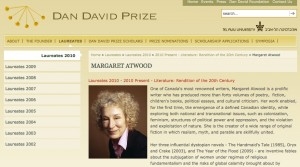
I felt a deep sharp pain in my stomach; I could swear that I saw the flotilla in the sea from my window; the water was red and I could swear that I smelled the blood, thick and iron-saturated.
The pain hit for a split second; it couldn’t last longer. The sun was shining perfectly in Beirut, and the sea was blue and everything in the air felt new. I know that pain, it was passed on to me from my grandfather. He carried it for a few months, and just like all pregnancies, he delivered it with an even greater pain. He had acknowledged that he lost something, not a land, but a history.
Palestinians tend to feel that they only existed in 1948 and often get upset when Israel tries to push this precious date of existence to 1967. Our wounds feel so old that it could not have possibly been that recent.
Somewhere between trying to feel efficient in responding to the flotilla attack and applying self-control so as not to emotionally break down in the presence of my colleague, I found Margaret Atwood’s article in Haaretz. I immediately remembered the intensity and admiration I felt when I read her novel “A Handmaid’s Tale.” I read her article and sank into a sea of disappointment.
If only Ms. Atwood would realize that the shadow over Israel is a place where Palestinian souls go to when they die, a delicate construction of Palestine. One day your average Israeli citizen will look up at the sky and realize that we do not disappear by murder and expulsion; we are born every time we die.
If Ms. Atwood hadn’t equated the suffering of Palestinians as a result of Israeli’s barbarity with Israeli’s sense of guilt, she would have saved the Palestinians further insult and an imposed sympathy that only ridicules the morale behind solidarity. If there is anything to be learned from the conflict, it is that any sympathy and solidarity with Palestine applied in order to polish one’s image only backfires.
What happened on the flotilla should provide Ms. Atwood with a good example of how evil plots cannot be rewritten in history, be it in 10 or 20 or 100 years. It will be acknowledged that the people killed on that ship were murdered by Israel. Whoever sets the rules of this world made sure to have a very clear equation: military vs. civilians is never a justified war. This is something Israel will not be able to change. It might be able to reduce the number of people who will pass it on, but it will never be able to change it.
Ms. Atwood didn’t have to justify her acceptance of the award. People accept and decline awards because they want to. The fact that the award-granting cultural organization is “pitching” dialogue and a two-state solution is completely irrelevant to the subject. Ms. Atwood accepted the award because she simply wanted to. What one must understand from this conflict is that Israeli crimes are not only powered by the state. They are powered by all of those who remain silent about them and those who create multiple images of Israel, propagating the ones that suit their (usually apologetic) position with regards to the conflict the most. I don’t think Palestinians want a two state solution, at least the Palestinians who are able to think and are not too busy being killed, murdered, besieged, exiled, harassed, violated, raped, and jailed.
What happened on the flotilla couldn’t be any greater evidence to how Israel seeks to engage others in the crimes it commits against Palestinians. Each time the world remains silent about what has happened, the world and its billions of inhabitants are partners in the crime.
Now, for the flotilla, we need partners in breaking the siege.
Ms. Atwood?
Publisher:
Section:
Category:






